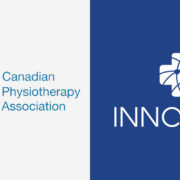Partnership supports arthritis awareness, physiotherapy education, drug-free treatments, and early diagnosis for the prevention of arthritis.
TORONTO, ONTARIO (DATE, 2018): The Arthritis Society and pt Health, a community clinic network with more than 230 locations across Canada, are proud to announce they have formalized a partnership focused on the benefit of physiotherapy to Canadians living with or at risk of developing arthritis. Specifically, the partnership will concentrate on increasing arthritis awareness, early detection and prevention, as well as the benefits of adding a Physiotherapist with increased arthritis knowledge to a patient’s treatment team. The goal of the program is to help patients living with arthritis realize the potential benefits of a drug-free treatment plan that may offer relief from chronic pain and discomfort as well as an improved quality of life.
“We know that more than six million Canadians live with arthritis and that the demand for real relief is only increasing,” says Heather Shantora, CEO, pt Health. “Physiotherapy has the potential to help reduce symptoms and help arthritis patients regain their quality of life. Together with the Arthritis Society, we are applying the best of what we know about arthritis to help offer patients an alternative to the pain they live with.”
Today, arthritis affects over 6 million Canadians. [i] Osteoarthritis (OA) is the most prevalent form of the disease. [ii] By 2040, it is estimated that more than 10 million or one in four Canadians will have OA. [iii] Similarly, the economic burden of arthritis on our society, with estimated direct and indirect costs of over $33 billion annually, is expected to rise.[iv]
Access to trained physiotherapists is a key component of reducing the personal and social burden of the condition. “The Arthritis Society recognizes physiotherapists as a valuable part of an arthritis patient’s treatment team,” says Janet Yale, CEO, Arthritis Society. “Recognizing the life-changing impact that a physiotherapist with expertise in arthritis can have on quality of life for someone living with arthritis, the Arthritis Society is proud to work with pt Health to help ensure professional development resources are available to help physiotherapists and other healthcare professionals offer better care to people with arthritis.”
This partnership is designed to help educate patients and caregivers about the condition. “It’s time to change our mindset about arthritis,” says Yale. “It is no longer necessary for someone to simply accept living with pain when they receive a diagnosis of arthritis.”
As part of the program, pt Health physiotherapists will develop individualised programs, customised for each patient’s unique needs, to help decrease inflammation, strengthen the muscles around the joint, increase range of motion, and reduce pain.
The partnership took effect on September 1, 2018.
About the Arthritis Society
The Arthritis Society is a national health charity, fuelled by donors and volunteers, with a vision to live in a world where people are free from the devastating effects that arthritis has on lives. Beginning in 1948 with one very clear goal – to alleviate the suffering of people impacted by arthritis – that same volunteer-led passion carries on today in communities across Canada. Through the trust and support of our donors and sponsors, the Arthritis Society is Canada’s largest charitable source of investments in cutting-edge arthritis research, proactive advocacy and innovative solutions that will deliver better health outcomes for people affected by arthritis. The Arthritis Society is accredited under Imagine Canada’s Standards Program. For more information and to make a donation, visit arthritis.ca.
[i] https://www.arthritis.ca/about-arthritis/what-is-arthritis/the-truth-about-arthritis
[ii] https://www.ncbi.nlm.nih.gov/pmc/articles/PMC3753584/
[iii] http://www.arthritisalliance.ca/images/PDF/eng/Initiatives/20111022_2200_impact_of_arthritis.pdf
[iv] http://www.arthritisalliance.ca/images/PDF/eng/Initiatives/20111022_2200_impact_of_arthritis.pdf










